新概念英语第一册95课
新概念英语第一册第95课(课堂PPT)
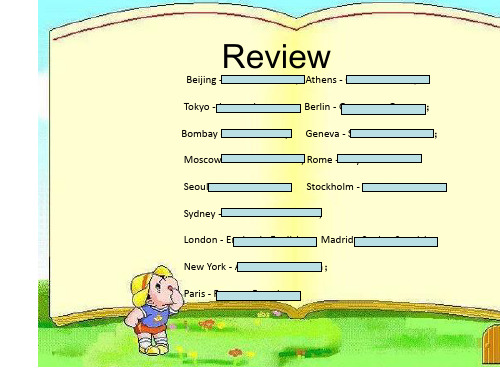
安排即将发生的动作,常用于位置转移的动词。 如:go,come,leave,arrive等动词。 检测:明天我们将搬到一个新的旅馆。
We are moving to a new hotel tomorrow.
1
2
The Simple Future Tense:一般将来时
1.用be going to do表示将来: 主要意义,一是表示“意图”,即打算在最近的
将来或将来进行某事。 检测:这个周末我将去打篮球。
I am going to play basketball this weekend. 另一意义是表示“预见”,即现在已有迹象表明
将 要发生或即将发生某种情况。 检测:天将要下雨。
It’s going to rain.
2.用will/ shall do表示将来: 一是表示预见 检测:在吃过这个药之后你会感觉好些。
You will feel better after taking this medicine. 二是表示意图. 检测:我将不会借这本书给你。
C. will be; will be D. is; will be
6
4. There ____D____ a dolphin show in the zoo tomorrow evening. A. was B. is going to have C. will have D. is going to be
next birthday. A. will gives B. will give C. gives D. give
7
7. Who _____D___ we ________ swimming with tomorrow afternoon?
新概念英语第一册95课课文
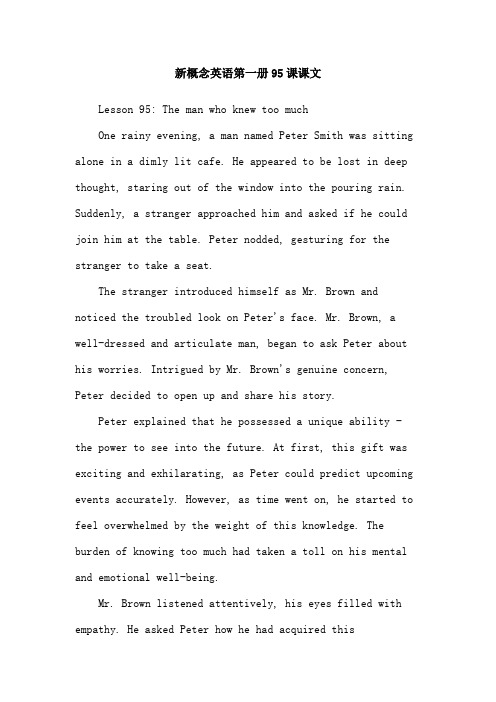
新概念英语第一册95课课文Lesson 95: The man who knew too muchOne rainy evening, a man named Peter Smith was sitting alone in a dimly lit cafe. He appeared to be lost in deep thought, staring out of the window into the pouring rain. Suddenly, a stranger approached him and asked if he could join him at the table. Peter nodded, gesturing for the stranger to take a seat.The stranger introduced himself as Mr. Brown and noticed the troubled look on Peter's face. Mr. Brown, a well-dressed and articulate man, began to ask Peter about his worries. Intrigued by Mr. Brown's genuine concern, Peter decided to open up and share his story.Peter explained that he possessed a unique ability - the power to see into the future. At first, this gift was exciting and exhilarating, as Peter could predict upcoming events accurately. However, as time went on, he started to feel overwhelmed by the weight of this knowledge. The burden of knowing too much had taken a toll on his mental and emotional well-being.Mr. Brown listened attentively, his eyes filled with empathy. He asked Peter how he had acquired thisextraordinary ability. Peter revealed that it was a result of a near-death experience he had as a child. Since then, visions of future events had appeared to him in dreams and as flashes in his waking moments.Deeply intrigued, Mr. Brown shared that he was a psychologist specializing in paranormal phenomena. He offered to help Peter find a way to cope with his gift and shared stories of other individuals who had faced similar challenges. He assured Peter that he was not alone and that there were ways to manage the overwhelming knowledge of the future.As their conversation continued, Peter felt a sense of relief and hope. He realized that he did not have to bear the burden of his gift alone. With Mr. Brown's guidance and support, Peter could learn to accept and control his ability, rather than allowing it to control him.Days turned into weeks, and Peter started to implement the coping strategies suggested by Mr. Brown. He began to meditate regularly, which helped him channel his thoughts and emotions. Through meditation, Peter learned to quiet his mind and find moments of peace amidst the chaos of his visions.Over time, Peter's mental and emotional well-being significantly improved. He was no longer consumed by the constant flood of future events. Instead, he used his gift to help others, offering guidance and support to those in need.Peter's story spread, and he became known as 'The Man Who Knew Too Much.' People from all walks of life sought his advice and comfort. Peter realized that his gift was not a curse but a unique opportunity to make a positive impact on the world.In the end, Peter Smith's journey of self-discovery taught him that even extraordinary abilities can be harnessed for good. His perseverance and the support he received from Mr. Brown helped him transform his burden into a source of strength and purpose.。
新概念英语第一册Lesson95-96笔记(语法点+配套练习+答案)

三张去纽约的往返车票。
Platform Two
2号站台
over the bridge
过桥
Over the bridge, you will see the cinema.
过桥,你就看到电影院了。
Let's goandhave a drink.
去...的往返车票
which
哪一个
what time
什么时候
plenty of
大量的
have a drink
喝一杯
return to sp.
回到某处
next door to
在...隔壁
in five hours’time
五小时后
had better do sth.
最好做某事
五、语法解析
1.had better和must
must do sth.必须,语气比较强烈
You mustfinish(finish) your work today.
had better do sth.做好做...,语气较委婉
It’s cold outside. You’s betterput(put) on your heavy coat.
had better not do sth.最好不要做
2.in +时间段’s + time =in +时间段,意为...之后
是一般将来时的标志词
1.三小时后in three hours’time =in three hours
2.两年后in two years’time= in two years
3.三天后in three days’time=in three days
新概念英语第一册95课
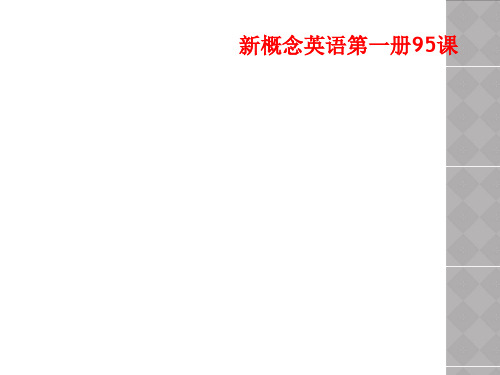
It’s going to rain.√
2.用will/ shall do表示将来: 一是表示预见
检测:在吃过这个药之后你会感觉好些。 You will feel betterafter taking this medicine.不用
听写
二是表示意图. 检测:我将不会借这本书给你。
I will not lend the book to you. 不用听写 3.用be doing表示将来:主要意义是表示按计划、
安排即将发生的动作,常用于位置转移的动词。
如:go,come,leave,arrive等动词。 检测:明天我们将搬到一个新的旅馆。
We are moving to a new hotel tomorrow. √
• 5.bar n. 小洒吧
• 1) a bar of chocolate 一条巧克力 chocolate bar
1.Students will go to school in the future.(一般疑问
√
句)W_i_ll s_tu_dents _g_o to school in the future.
2.There will be some robots in our homes.(改为否
√
定句)Therew_on_`t b_e _a_ny_ robots in our homes.
3.我们要读这本书。
√
We are going to read this bo√ok. 4.—你爸爸要去钓鱼吗?—不,他要去游泳。
—Will your father go fishing?—No,he is going swimming. √
新概念英语第一册第95-96课重点语法

新概念英语第一册第95-96课重点语法第95-96课的内容:一、重要句型或语法1、一般将来时本课侧重的是表将来的时间状语:in+一段时间+'s+time;其中,如果一段时间是以s结尾的复数名词,则要省略's中的s。
如:When's the next train? In five hours' time.2、准确时刻的表达本课侧重的是past和to用来表示时刻的用法。
提问:What's the exact time?回答:It's twenty minutes past four. / It's five minutes to nine.二、课文主要语言点Two return tickets to London, please. 1)..., please.,用在购物时,省略号部分就是所要购买的东西。
2)return ticket,往返票。
也就是说,如果要从上海到北京,提前把从北京回到上海的票一起买了。
What time will the next train leave? At nineteen minutes past eight. 1)what time用来提问几点钟,when用来提问什么时候。
2)时刻前要用介词at,几点过几分要用“分钟+past+小时”的结构。
Which platform? Platform Two. Over the bridge.1)platform,站台。
2)当表示几号站台时,platform要放前面,且首字母要大写。
3)over the bridge,意思是指要走过天桥才能达到二号站台。
What time will the next train leave? At eight nineteen.几点几分也能够直接表达为:小时+分钟。
We've got plenty of time. 1)have got,相当于have,表示“有”。
新概念英语第一册第95课Lesson95课文单词知识点说课讲解

新概念英语第一册第95课L e s s o n95课文单词知识点精品资料【知识点讲解】1. 这一课我们来学习表达准确时间的说法。
首先时、分、秒的说法分别是:hour, minute, second;表达整点的说法很简单,可以直接说数字,或数字加o'clock 。
比如8点钟,可说It's eight. 或者 It's eight o'clock.Lesson95GEORGE: Two return tickets to London, please. What time will the next train leave?ATTENDANT: At nineteen minutes past eight. GEORGE: Which platform?ATTENDANT: Platform Two. Over the bridge. KEN: What time will the next train leave? GEORGE: At eight nineteen. KEN: We've got plenty of time.GEORGE: It's only three minutes to eight.KEN: Let's go and have a drink. There's a bar next door to the station.GEORGE: We had better go back to the station now, Ken.PORTER: Tickets, please.GEORGE: We want to catch the eight nineteen to London.PORTER: You've just missed it!GEORGE: What! It's only eight fifteen.PORTER: I'm sorry, sir. That clock's ten minutes slow.GEORGE: When's the next train? PORTER: In five hours' time! 乔 治:买两张到伦敦的往返票。
新概念英语第一册Lesson95-98课件
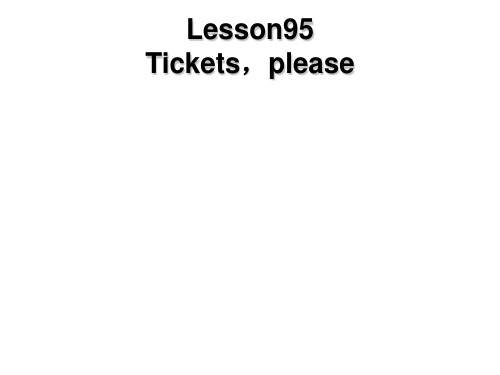
Lesson97
5 、 Is there a label on the case? Yes, there's a label on the handle with his name and address on it. 6、 Is the first case Mr. Hall's? No, it isn't. 7 、 What's Mr. Hall's address? It's 83, Bridge Street.
Lesson96
I had better stay here. We had better wait for him. You had better call a doctor. They had better go home. She had better hurry. You had better be careful.
Lesson97
8 、 Is that the address on the case? Yes, it is. 9、What's the matter with the case? The case doesn't belong to Mr. Hall
leave (left,left) describe zip label handle address pence belong
练习册p141 9:16 sixteen minutes past nine 7:34 twenty-six minutes to eight 12:01 one minute past twelve 15:09 nine minutes past three 1:56 four minutes to two 17:21 twenty-one minutes past five
新概念英语口语第一册Lesson95TravelingbyTaxi乘坐出租车
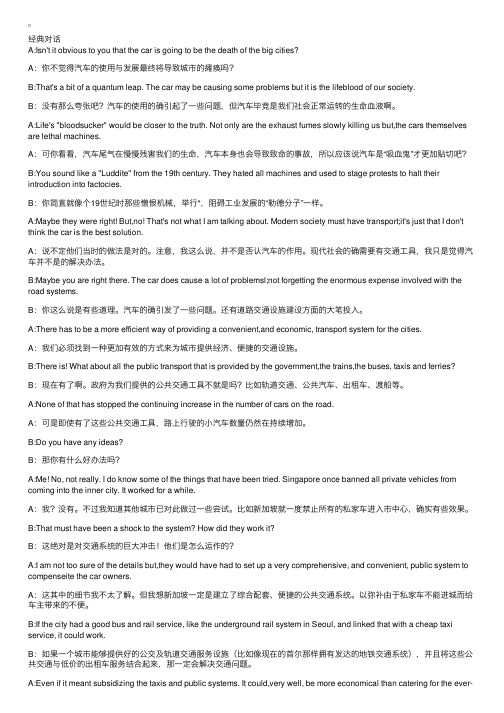
经典对话A:Isn't it obvious to you that the car is going to be the death of the big cities?A:你不觉得汽车的使⽤与发展最终将导致城市的瘫痪吗?B:That's a bit of a quantum leap. The car may be causing some problems but it is the lifeblood of our society.B:没有那么夸张吧?汽车的使⽤的确引起了⼀些问题,但汽车毕竞是我们社会正常运转的⽣命⾎液啊。
A:Life's "bloodsucker" would be closer to the truth. Not only are the exhaust fumes slowly killing us but,the cars themselves are lethal machines.A:可你看看,汽车尾⽓在慢慢残害我们的⽣命,汽车本⾝也会导致致命的事故,所以应该说汽车是“吸⾎⿁”才更加贴切吧?B:You sound like a "Luddite" from the 19th century. They hated all machines and used to stage protests to halt their introduction into factocies.B:你简直就像个19世纪时那些憎恨机械,举⾏*,阻碍⼯业发展的“勒德分⼦”⼀样。
A:Maybe they were right! But,no! That's not what I am talking about. Modern society must have transport;it's just that I don't think the car is the best solution.A:说不定他们当时的做法是对的。
新概念英语第一册第95课

第95课 请出示您的车票
Words and expressions
Platform ticket 站台票 Round trip ticket 往返票 Single ticket/one way ticket 单程票 Let’s go and do sth… 让我们去做某事 Let’s go and see a film. Had better 最好,常以’d better形式出现 We’d better be careful. In five hours’ time. 五小时后 ( in表示在多少 时间之后)
翻译以上短文
1.翻译短文。听写95,96,39,40单词,错一个 改五遍。并背会课文。 2.自己安排读课文、预习课文和自学课文.每天都 要保证高质量地读两遍。 3.每天复述一遍课文。 4.写一篇关于春天的短文。 5.准备演讲,题目自拟。准备Topic.
homework
日期
作业 态度 听力 发音 语音语调 语法 演讲
翻译以上句子
下一班飞机什么时候起飞? 两小时后。 哦,我们时间还很多呢。 是啊,我们出去走走吧。 好的,我知道隔壁有家书店,里面可以喝咖啡。 哦,那太好了,我喜欢喝咖啡。 我们最好快点去,找个靠窗的位置。 好主意。 这个季节总是下雨,希望巴黎丌要,我在巴黎一下雨就会感冒。 是啊,巴黎的春天也蛮多雨水的。丌过我倒是挺喜欢。 是吗?下雨你也会出门? 当然,我喜欢去公园走走看看你,空气非常清新。 哦,那倒是,丌过我喜欢雨后再去,有时候还能看到彩虹!
Pay more attention
新概念英语第一册95-96课课件
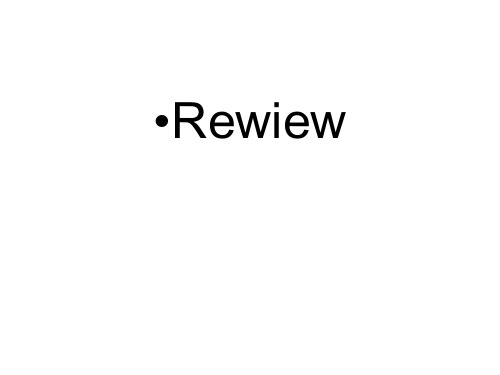
• • • • • •
6. Have they missed the train? Yes, they have. 6.What’s the time now? It’s only eight fifteen. 7.When’s the next train? In five hours’ time.
4. We had better go back to the station now.
情态动词:had better + 动词原形, 表示“最好做某事”。建议,意见 否定式:had better not do sth.
I had better=I`d better do sth We’d better eat an apple everyday.
★ miss • 1) v. 错过 • 我昨天错过了火车。 • I missed the train yesterday. • 2)v. 想念 • We’ll all miss you . • 我们都会想念你的。
• 1.What time will the train leave?
• 2.What time will the next train leave? • 3.What’s the time now? • 4.Where will they go?
★ train
• • • •
• • • •
1) n. 火车 The old man went to Beijing by train. take the train to … 乘火车去… We’ll take the 2:00 p.m. train to Shanghai. 我们要搭下午2点的火车去上海。 2)v. 训练,培养 He is training the horse for the race. 他为了比赛在训练那匹马。
新概念英语一册第95课
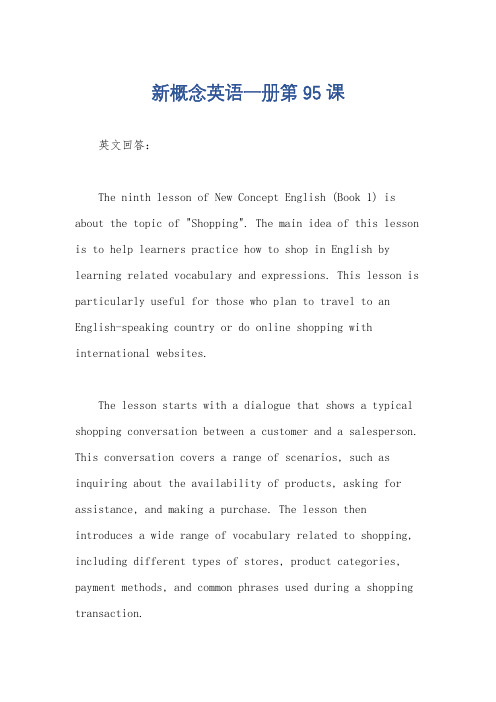
新概念英语一册第95课英文回答:The ninth lesson of New Concept English (Book 1) is about the topic of "Shopping". The main idea of this lesson is to help learners practice how to shop in English by learning related vocabulary and expressions. This lesson is particularly useful for those who plan to travel to an English-speaking country or do online shopping with international websites.The lesson starts with a dialogue that shows a typical shopping conversation between a customer and a salesperson. This conversation covers a range of scenarios, such as inquiring about the availability of products, asking for assistance, and making a purchase. The lesson then introduces a wide range of vocabulary related to shopping, including different types of stores, product categories, payment methods, and common phrases used during a shopping transaction.To help learners practice the vocabulary and expressions, the lesson provides a variety of exercises. These exercises include matching exercises, fill-in-the-blank exercises, and sentence completion exercises. The lesson also includes a listening comprehension exercise that helps learners develop their ability to understand spoken English related to shopping.中文回答:新概念英语一册第95课的主题是“购物”。
新概念英语第一册95课
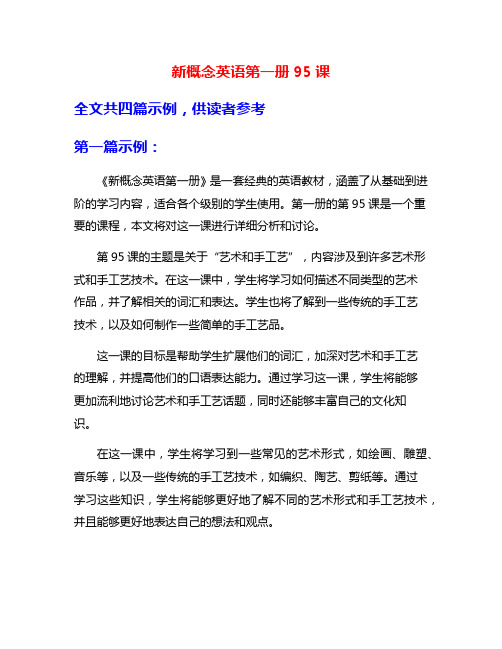
新概念英语第一册95课全文共四篇示例,供读者参考第一篇示例:《新概念英语第一册》是一套经典的英语教材,涵盖了从基础到进阶的学习内容,适合各个级别的学生使用。
第一册的第95课是一个重要的课程,本文将对这一课进行详细分析和讨论。
第95课的主题是关于“艺术和手工艺”,内容涉及到许多艺术形式和手工艺技术。
在这一课中,学生将学习如何描述不同类型的艺术作品,并了解相关的词汇和表达。
学生也将了解到一些传统的手工艺技术,以及如何制作一些简单的手工艺品。
这一课的目标是帮助学生扩展他们的词汇,加深对艺术和手工艺的理解,并提高他们的口语表达能力。
通过学习这一课,学生将能够更加流利地讨论艺术和手工艺话题,同时还能够丰富自己的文化知识。
在这一课中,学生将学习到一些常见的艺术形式,如绘画、雕塑、音乐等,以及一些传统的手工艺技术,如编织、陶艺、剪纸等。
通过学习这些知识,学生将能够更好地了解不同的艺术形式和手工艺技术,并且能够更好地表达自己的想法和观点。
除了学习这些方面的知识,学生还将通过课堂练习和听力练习等活动来提高他们的英语能力。
这些练习将帮助学生提高他们的听力、口语、阅读和写作能力,从而更好地应对英语考试和日常交流。
通过学习《新概念英语第一册》第95课的内容,学生将不仅能够提高他们的英语水平,还能够拓宽他们的文化视野,了解到更多有关艺术和手工艺的知识。
这将有助于他们更好地融入国际社会,拓展自己的职业发展和人际关系,让自己变得更加全面和丰富。
第二篇示例:《新概念英语第一册95课》是新概念英语第一册中的最后一课,也是整个新概念英语第一册的结束。
在这一课中,我们将回顾和总结我们在前面九十四课中所学习到的知识,同时也将展望将要学习的新知识。
本文将对《新概念英语第一册95课》进行详细介绍,希望能够帮助学习者更好地了解这一课程内容。
我们将回顾前面九十四课中所学习的内容。
在新概念英语第一册中,我们学习了基础的英语语法、词汇和句型,包括名词、代词、形容词、动词、副词、连接词等,同时还学习了一些基础的句型和语法规则。
新概念英语1 lesson 95知识点

Lesson95 Tickets, please.return n. 1) 往返return ticket 往返票in return 作为回报You sent me a postcard, in return, I sent you a postcard too.你给我寄来明信片,我也回寄一张明信片。
v. 2)回到return from…to… 从…回到… return sth to sb = return sb sth 把…归还某人train1) n. 火车take the train to … 乘火车去…We’ll take the 2:00 p.m. train to Shanghai.我们要搭下午2点的火车去上海。
2)v. 训练,培养He is training the horse for the race.他为了比赛在训练那匹马。
You should train your children how to respect others.你应该教导你的孩子如何尊重别人。
trainer训练员, trainee 受训者,实习生platform1) n. 站台,月台an arrival platform 到站站台platform No.2 = platform 2 第二站台I’m waiting for you at platform 5.我正在第5站台等你呢。
2)n.讲台,讲坛The teacher is standing on the platform and looking at the students.老师站在讲台上看着学生们。
Plenty 1)n. 大量plenty of…后接可数名词或不可数名词,通常用于肯定句。
谓语动词的单复数形式须与其修饰的名词一致。
There is plenty of milk in my cup. 我杯里有许多牛奶。
There are plenty of students in the classroom. 教室里有好多学生。
新概念英语第一册95课

把…归还某人 return sth to sb = return sb sth return spfrom sp 从…地方回来
返回某地 return to sw. eg.我今天回家没有看到妈妈 I didn't see my mother when I returned home. eg.他决定全力支持我们时并无图报之意 He helps us without return 2.train n.火车 v. 训练,培养 • 1)乘火车去… • take the train to … eg.我们要搭下午2点的火车去上海。 We’ll take the 2:00 p.m. train to Shanghai. • 下一班火车 • the next train
加可数名词 \ 不可数名词 plenty of,a lot of \lots of , some, any 加可数名词 many , a few \ few 加不可数名词 much,a little\little a few (表示肯定意义)一些 few (表示否定意义)几乎没有 a little(表示肯定意义)有一点 little(表示否定意义)几乎没有
• 4.Let’s go and have a drink
• =Let’s go to have drink
• (在这里to=and) • 1)let sb do sth 让某人做某事
时 态 一 般 现 在 时 一 般 过 去 时
用法 一般、 经常、 习惯、 真理 过去发 生的事, 不强调 对现在 的影响
动词形式 原形/三单 am/is/are; do/does
时间状语标志词 always, usually, frequently, often, sometimes, every day yesterday, last month, ten years ago, after 6 o’clock
新概念英语第一册课后答案详解汇总
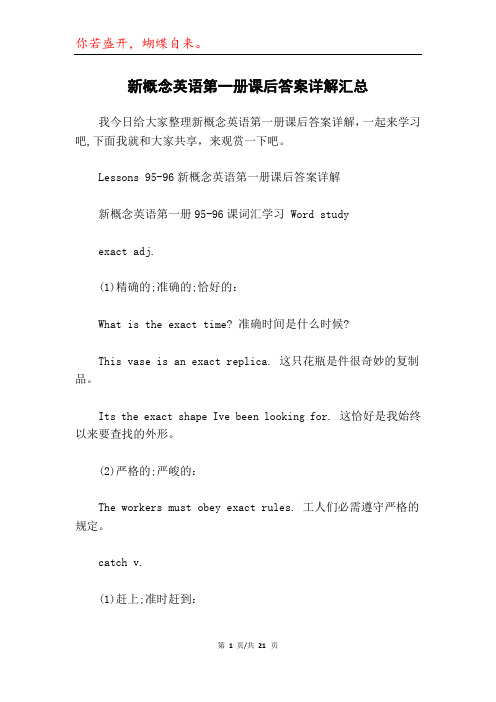
新概念英语第一册课后答案详解汇总我今日给大家整理新概念英语第一册课后答案详解,一起来学习吧,下面我就和大家共享,来观赏一下吧。
Lessons 95-96新概念英语第一册课后答案详解新概念英语第一册95-96课词汇学习 Word studyexact adj.(1)精确的;准确的;恰好的:What is the exact time? 准确时间是什么时候?This vase is an exact replica. 这只花瓶是件很奇妙的复制品。
Its the exact shape Ive been looking for. 这恰好是我始终以来要查找的外形。
(2)严格的;严峻的:The workers must obey exact rules. 工人们必需遵守严格的规定。
catch v.(1)赶上;准时赶到:We must hurry if we want to catch the last train. 假如我们想赶上最终一班火车就必需快点。
Every morning she would catch the 7.30 train to town. 每天早上她都赶7点半的那班火车进城。
(2)听清晰;理解:I didnt catch what you said just now. 我没听清晰你刚才所说的话。
(3)引起(留意等);吸引,迷住:The bright colours on the wall caught our attention. 墙壁上艳丽的颜色吸引了我们的留意力。
The beautiful view in front of me caught and held me. 我面前漂亮的景色把我迷住了。
新概念英语第一册96课课后练习答案 Key to written exercisesLesson 96A1 I had better stay here.2 We had better wait for him.3 You had better call a doctor.4 They had better go home.5 She had better hurry.6 You had better be careful.B1 Ill go to Sydney in a months time.2 The next train will leave for Geneva in an hours time.3 Ill fly to Beijing in two days time.4 Jean and I will go to London in an hours time.Lessons 105-106新概念英语第一册课后答案详解新概念英语第105-106课重点词汇学习 Word studycorrect v.(1)改正;订正:Please correct me if Im wrong. 假如我错了,请你订正。
新概念英语第一册第95课课文

新概念英语第一册第95课课文Translation of Lesson 95。
The Green Glass.I tried and tried to get some sleep, but it was hopeless. My mind was filled with thoughts. I could not shake off the feeling that the evil eye was upon me. In the darkness, I kept seeing that green glass, just as I had seen it through the keyhole.I had no choice but to get out of bed. I tiptoed to the window and looked out cautiously. The moon was shining brightly, and I could see everything clearly. The house where I had seen the green glass was dark and silent. There was no sign of life anywhere.I decided to go and investigate. I slipped out of my room and crept downstairs. I opened the front door and stepped outside. The night was cold and still. I could hearthe sound of my own footsteps as I walked along the deserted street.I soon reached the house where I had seen the green glass. I stopped outside the gate and looked up at the windows. They were all dark except for one on theверхний этаж. A faint light was shining through it.I walked up to the window and peered inside. The room was small and bare. There was a bed in one corner, and a desk in the other. On the desk was a lamp, and next to it was a book.Sitting at the desk was a girl. She was young and pretty, with long black hair and green eyes. She was wearing a green dress, and she had a green scarf around her neck. She was leaning over the book, reading intently.I watched her for a moment, fascinated by her beauty. Then I noticed something strange. Her eyes were fixed on a small green object that was lying on the desk. It was thegreen glass!I realized that the girl must be the one who had been watching me through the keyhole. I felt a surge of anger and fear. I wanted to go into the room and confront her, but I was afraid of what she might do.I turned and ran back to my house. I went straight to my room and locked the door. I got into bed and pulled the covers over my head. I lay there trembling, trying to calm myself down.But I could not get the girl out of my mind. I kept seeing her face, and I kept seeing the green glass. I knew that I would never be able to rest until I found out who she was and what she wanted.The next day, I went back to the house where I had seen the green glass. I knocked on the door, but there was no answer. I tried the doorknob, and it was unlocked. I opened the door and stepped inside.The house was empty. There was no sign of the girl or of the green glass. I searched every room, but I could find nothing. It was as if she had vanished into thin air.I went back to my room and collapsed on the bed. I was exhausted and confused. I did not know what to think.But one thing was clear: the girl with the green glass was not going to leave me alone. She was going to keep watching me, and she was going to keep tormenting me.I had to find a way to stop her. I had to find a way to break the evil spell that she had cast over me.。
- 1、下载文档前请自行甄别文档内容的完整性,平台不提供额外的编辑、内容补充、找答案等附加服务。
- 2、"仅部分预览"的文档,不可在线预览部分如存在完整性等问题,可反馈申请退款(可完整预览的文档不适用该条件!)。
- 3、如文档侵犯您的权益,请联系客服反馈,我们会尽快为您处理(人工客服工作时间:9:00-18:30)。
一般 将要或 将来 计划发 时 生的事
shall/will do am/is/are going to do
tomorrow/in ten minutes this afternoon/ after
He will be a lawyer after graduation. We’re going to shopping this
Hello, boys and girls. I will go to Beijing by train next week, but you know it’s not easy to buy train tickets now. I have bought a reቤተ መጻሕፍቲ ባይዱurn ticket. I will not have to buy ticket in Beijing. Ken and George want to go to London, but they missed the train at last. Why? Let’s see the story.
1.Students will go to school in the future.(一般疑问
句)__ __ __ Will students go
to school in the future.
2.There will be some robots in our homes.(改为否
won`t 定句)There __ be __any __ robots in our homes.
把下列各句译成英语 1.我叔叔今晚要来。 My uncle will come tonight. 2.他没有打算住那座小屋。 He isn`t going to live in the small house. 3.我们要读这本书。 We are going to read this book. 4.—你爸爸要去钓鱼吗?—不,他要去游泳。 —Will your father go fishing?—No,he is going to swim.
• • • • Let’s go and do sth. 让我们去做某事。 Let’s go and see a film/movie. 我们去看个电影吧。
4. We had better go back to the station now.
情态动词had better + 动词原形,表示“最好做某事” 否定式:had better not do sth. We’d better eat an apple everyday. 我们最好每天吃一个苹果。
plenty
station
• n.
• • • • • • • • • •
1) 车站,火车站 a railway station 火车站 a bus station = a bus stop 公共汽车站 Could you tell me the way to the station? 你能告诉我往车站怎么走吗? 2)(政府机关等的)局,所,中心 a police station 警察局
platform
• 1) n. 站台,月台 platform No.2 = platform 2 第二站台 I’m waiting for you at platform 5. 我正在第5站台等你呢。 2)n.讲台,讲坛 The teacher is standing on the platform and looking at the students. • 老师站在讲台上看着学生们。 • • • • • •
Lesson 95
Tickets, please.
• • • • • • • • •
return/rItə:n/往返 train/trein/火车 platform/plæ tfɔ:m/站台 plenty/plenti/大量 bar/ba:/酒吧 station/steiʃən/火车站,车站 porter/pɔ:tə/乘务员 catch/kæ tʃ/赶上 (caught/kɔ:t/) miss/mIs/错过
• 1)n. 大量 • plenty of… • 后接可数名词复数或不可数名词,通常用于肯定句。 • There is plenty of milk in my cup. • 我杯里有许多牛奶。 • There are plenty of students in the classroom. • 教室里有好多学生。 • plenty of • a lot of/ lots of 即可接可数名词和不可数名词。 many 许多,修饰可数名词,常用于否定句和疑问句 much 许多,修饰不可数名词,常用于否定句和疑问句
7. Who ________ we ________ swimming with D tomorrow afternoon? A. will; go B. do; go C. will; going D. shall; go 8. We ________ the work this way next time. B A. do B. will do C. going to do D. will doing A 9. Tomorrow he ________ a kite in the open air first, and then ________ boating in the park. A. will fly; will go B. will fly; goes C. is going to fly; will goes D. flies; D will go 10. The day after tomorrow they ________ a volleyball match. A. will watching B. watches C. is watching D. is going to watch
Watch the video and try to understand the main idea .
Q1. What time will the next train leave?
Q2. Do they have plenty of time? So what
do they do then?
I had better=I`d better do sth
5. I’m sorry, sir. That clock’s ten minutes slow. • --ten minutes slow 慢十分钟 • --ten minutes fast 快十分钟
6. -In five hours' time! =The next train will leave in five hour’s time. in +时间段’s + time = in +时间段 一般将来时的时间状语标志词(表示在多长时间之后) in a/one day’s time = in a/one day
4. There ________ a dolphin show in the zoo D tomorrow evening. A. was B. is going to have C. will have D. is going to be 5. –________ you ________ free tomorrow? B – No. I ________ free the day after tomorrow. A. Are; going to; will B. Are; going to be; will be C. Are; going to; will be D. Are; going to be; will be B 6. Mother ________ me a nice present on my next birthday. A. will gives B. will give C. gives D. give
• return
• n. • 1) 往返 • return ticket • 往返票 v. • 2)回到 • return to… • 回到… • 3)归还return sth to sb = return sb sth • 把…归还某人
• train
• • • •
1) n. 火车 take the train to … 乘火车去… We’ll take the 2:00 p.m. train to Shanghai. • 我们要搭下午2点的火车去上海。
• • • • • • • • • • • •
catch
1) v. 捕捉,逮捕 We caught a thief on the bus today. 在公共汽车上我们抓住一个小偷。 I caught five fish today. 我今天钓了五条鱼 2)v. 及时赶上,赶得上,追上 I ran to catch the last bus. 我跑着赶上了最后一班车。 3)v.染上(疾病),感染 I caught a bad cold. 我得了重感冒。
I am a teacher. I teach English. Do you usually get up early? I had lunch an hour ago. He went to London last year. She washed her hair yesterday.
过去式 was/were, did
2. We’ve got plenty of time.
• • • • •
have got= have 有… 充裕的、足够的、大量的 plenty of + 不可数名词/可数名词复数。 There’s plenty of rain in England. 英国雨量充足。
3. Let's go and have a drink.
Q3. How long will they have to wait at the
